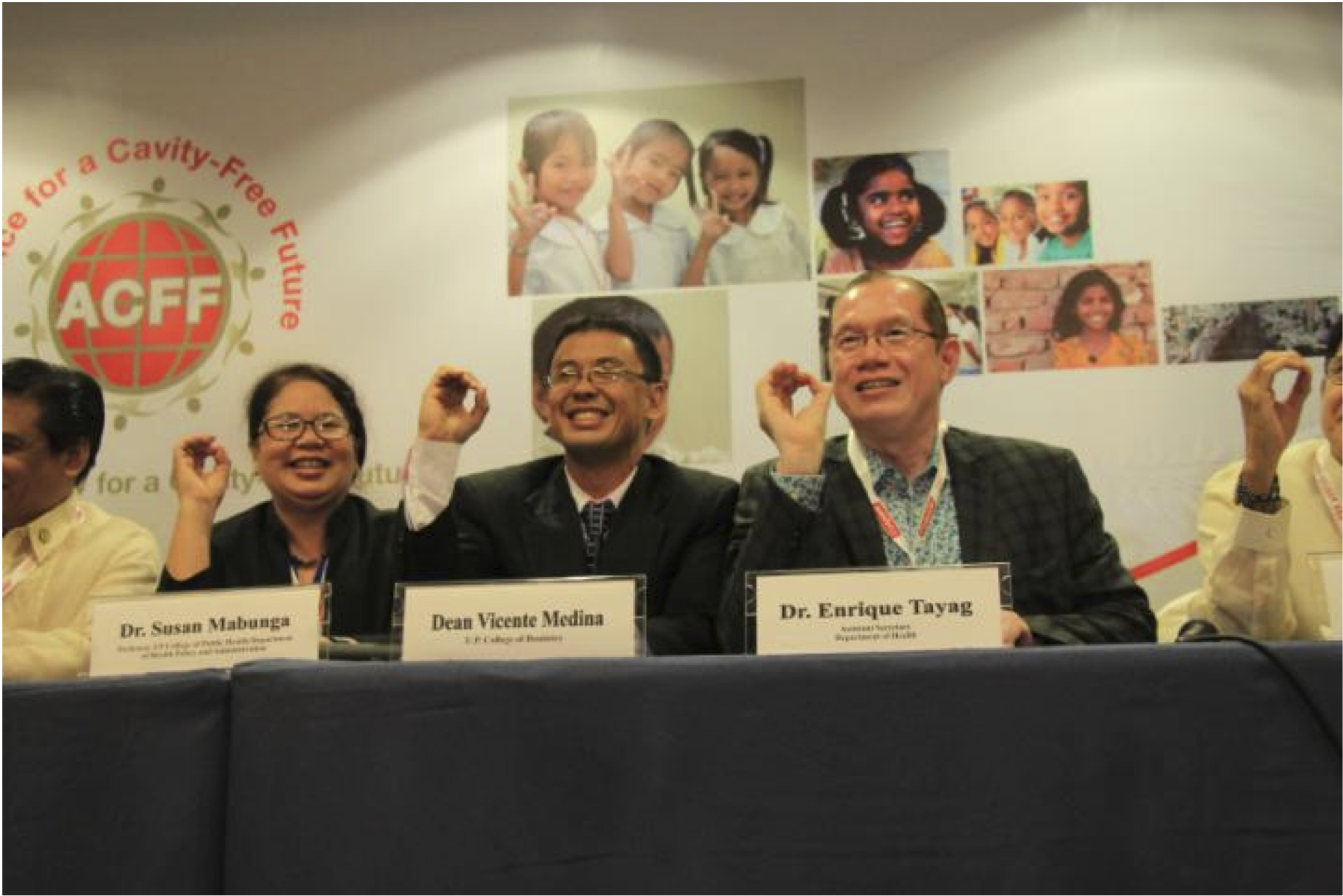Representatives from the academe, the government, and the private sector form the “zero-cavity” sign as part of a commitment to a cavity-free future at the launch of the Philippine chapter of the Alliance for a Cavity-Free Future (ACFF). From L-R: Dr. Susan Yanga-Mabunga, UP College of Public Health and Co-Chair of the ACFF Philippine Chapter; Dr. Vicente Medina, UP College of Dentistry and Chairman of the ACFF Philippine Chapter; and Dr. Enrique Tayag, Assistant Secretary, Department of Health

MANILA, PHILIPPINES – Joining together at the 105th Annual Philippine Dental Association (PDA) Convention, government officials dentists, public health practitioners, academicians, physicians and other stakeholders launched a national campaign, theAlliance for a Cavity-Free Future (ACFF), to stop cavities (a.k.a., dental caries), NOW! The Philippine Chapter of the ACFF calls for national collaborative action to challenge leaders and stakeholders in the community to: a) learn the importance of caries as a disease continuum; b) recognize that cavities are preventable and, in the early stages, reversible; and c) develop comprehensive programs for caries prevention and management in the Philippines.
Tooth decay is the most common chronic disease on the planet, affecting five billion people, or nearly 80 percent of the world’s population.1 According to the 2006 National Oral Health Survey conducted by the Department of Health, 92.4 percent of Filipinos have tooth decay, which, while not life-threatening, can be a cause of potentially dangerous diseases and infections.2
“Lowering the prevalence and eventually eradicating dental caries in the Philippines is an endeavor that has to be undertaken by the public and private sectors,” says Dean Vicente O. Medina III, Chair of the ACFF Philippine Chapter. “Given the progression from tooth decay to more serious health issues such as systemic infections, it is a public health issue that, when addressed, can improve general health, well-being and the quality of life of all Filipinos.”
In the Philippines, the top contributing factors to the high prevalence of dental caries are poor oral hygiene, a sugar –rich diet, and rare dental check-ups. The frequent ingestion of sugar-rich foods and drinks (i.e., kakanin, babana cue, cakes, doughnut, soft drinks) is the major source of fermentable sugar that caries-causing bacteria convert into acids which in turn soften the enamel resulting in tooth decay.
National Declaration to Elevate New Way of Looking at Caries
During the launch, the stakeholders of oral health signed a national declaration committing to the goals of the ACFF. Individuals signing the declaration included members of the ACFF Expert Panel and representatives from various sectors of the dental and public health professions, including (in alphabetical order) Asia Pacific Dental Federation (APDF); Department of Health (DOH); DOH Women, Children, and Family Cluster; Department of Education (DepEd); Health and Nutrition Center, DepEd; Department of Interior Local Government (DILG); Pediatric Dentistry Association of Asia (PDAA); Philippine Association of Dental Colleges; Philippine Dental Association (PDA); Philippine Society of Pediatric Dentistry (PPDSI); Philippine Pediatric Society; PRC Board of Dentistry; Pierre Fauchard Academy, U.P. College of Dentistry and the Department of Health Policy and Administration; U.P. College of Public Health
“The Department of Health, the PDA, and corporations of interest have begun ramping up efforts to promote better dental health in the country, beginning with educational efforts on preventing and managing dental caries,” says PDA President- Elect, Dr. Corazon S. Flores. “Eradicating dental caries is a ground-up effort, and we must enable each Filipino to learn and practice good daily dental habits. By reinforcing a culture aiming for a cavity-free future, dental practitioners and public health officers can then move their focus from restoration and management to prevention and protection.“
Ongoing Public Health Action
Aligned with the global objectives, the Philippine Chapter of the ACFF has identified the following long-term goals:
§ By 2016, ninety percent of dental schools and dental associations should have embraced and promoted the “new” approach of “caries as a continuum” to improve dental caries prevention and management.
§ By 2020, regional members of the Alliance for a Cavity-Free Future should have integrated, locally appropriate, comprehensive caries prevention and management systems and monitoring developed and in place.
§ Every child born from 2026 should stay cavity free during their life time.
Caries as a Continuum
The formation of cavities occurs along a continuum, which spans a series of stages from small initial caries lesions that might evolve in time to gross cavities. Each time we eat, sugars from food are converted to harmful acids by bacteria in our mouth. As acid levels rise, pH levels decrease, which cause a loss of mineral structure from the tooth’s surface. Teeth are in a constant state of demineralization and remineralization, impacted by our dietary patterns and oral hygiene practices. When the rate of demineralization occurs more quickly than remineralization, early white-spot lesions (caries) can form. Importantly, early caries is both preventable and reversible with proper management. However, without proper care, teeth continue losing strength and structural integrity, eventually forming a cavity. Relentless progression through all the stages of disease severity is however, not inevitable.
About The Alliance for a Cavity-Free Future
The Alliance for a Cavity-Free Future is a worldwide group of experts who have joined together to promote integrated clinical and public health action in order to stop caries initiation and progression in order to move towards a Cavity-Free Future for all age groups. Overall, the group believes that global collaborative action is needed to challenge global leaders and other regional and local stakeholders to learn the importance of caries as a disease continuum and to participate in action toward the delivery of comprehensive caries prevention and management that can positively influence the continuing problem of caries.The Alliance for a Cavity-Free Future was built in collaboration with a worldwide panel of experts in dentistry and public health. It is sponsored by Colgate-Palmolive Company, which supports improved oral health through its partnerships with the dental profession and government and public health agencies and its global children’s oral health education initiative Bright Smiles, Bright Futures. Given the goal of driving global collaborative action, the Alliance also aims to partner with global leaders and other stakeholders on a regional and local level – including country and community leaders, health and dental health professionals, public policy and education communities, and the public.
References:



















